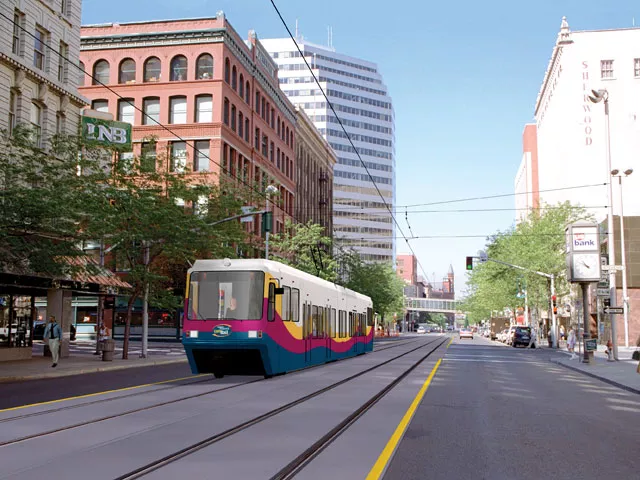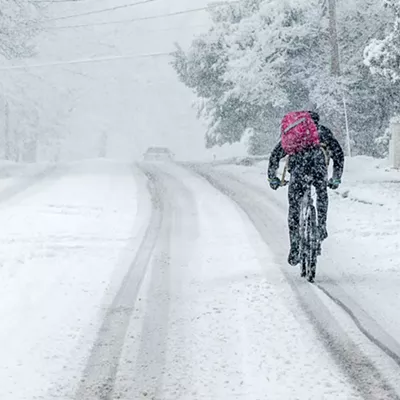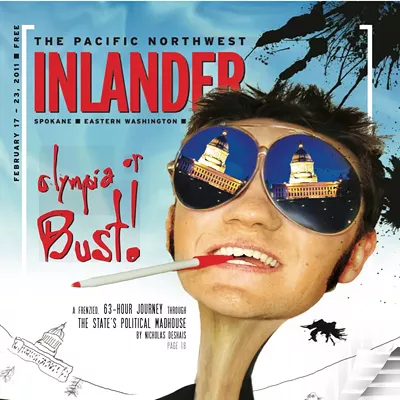LIGHT RAIL
Susan Meyer and Jon Snyder agree: This decade will host a massive change in how we get around. New bus routes. New bike lanes. Maybe even a streetcar.
Not necessarily light rail. “It depends on population, density and our willingness to pay for it,” says Meyer, CEO of Spokane Transit Authority. “We’re going to have much better transportation in 10 years that could include more routes and new modes of transportation we don’t have now.”
“We have a long way to go to get the planning process back on track,” says Snyder, a transportation-minded member of Spokane’s City Council, about the path to light rail. “But it still can be done. … The federal government is likely to assist with more transit projects in the coming years, and we need to be prepared for those opportunities.”
Not a problem, adds Meyer. “We will have light rail at some point in the future.”
A NEW SKYSCRAPER
Definitely, says Mick McDowell. Doubtful, says Rob Brewster. “There will be an eight-story building built within the next five years, maybe even by me,” says McDowell, the downtown developer who raised the AmericanWest building in 2004. “We’ve had a recession, but this recession is about to end. The demand for [new] space will be very high.”
Brewster, who owns a number of properties downtown, isn’t as optimistic, though he says it’s important to erect a new building taller than any other downtown Spokane structure.
“If anything, it’s going to be residential. We need more office space like we need a hole in the head,” he says. To get a new building, Spokane — and the state — needs to change the way construction is taxed.
“The difference between doing business in Portland and doing business in Washington is phenomenal,” he says, mainly referring to the lack of sales tax in Oregon. “That [tax] usually comes off the outside of the building. That’s why Seattle’s buildings are that corrugated metal crap, and there are no new buildings in Spokane.”
A FULL MEDICAL SCHOOL
“We already have [the first, third and fourth years] of medical education in Spokane,” says Barbara Chamberlain, spokeswoman for WSU Spokane. “We already have research faculty doing medical research at WSU Spokane and in the clinics and hospitals, and we have funding to design the next building at Riverpoint [in the University District] that will help us accommodate expansion of our health professions programs. We just need funding to add the second year and then expand the overall class size, and we’ll have a full medical program.” Indeed, in October, UW’s president told Greater Spokane Incorporated that we’ll have a med school “as soon as possible.”
GETTING A MAJOR PRO SPORTS TEAM
“It’s not a big enough TV market. … That’s what drives the bus now,” says Dennis Patchin of KXLY and ESPN radio. Patchin adds that with the exception of Green Bay, Wisc., there’s no pro sports market as small as Spokane. (And today, Green Bay wouldn’t have a chance of, say, adding a Major League Baseball team.) Plus, the Spokane Arena doesn’t have nearly enough seats or press boxes.
THE DEATH OF THE SPOKESMAN-REVIEW
“If you asked me if the print product would be distributed to fewer people, I think that’s true. … I think we’ve seen a major leveling off of newsroom layoffs,” says Shaun Higgins, director of sales and marketing at the Spokesman-Review. Higgins says they’re “ahead of the curve” when it comes to their digital products but adds that he doesn’t expect any major expansion in their editorial staff.
THE GONZAGA BULLDOGS MAKING THE “FINAL FOUR”
“As close as they were in 1999, and despite their amazing evolution since, they may never be so close again,” says John Blanchette, a Spokesman-Review sports columnist. “It’s, well, hard. Only 34 different schools have done it in the past 20 years, and despite what the nouveau fan base believes, Gonzaga isn’t Duke or Kentucky. If the tournament is expanded, that means a fi fth game to win to get to the Final Four. Then again, George Mason did it. Why not Gonzaga?”
CITY-COUNTY CONSOLIDATED GOVERNMENT
“I don’t believe we will see any actual consolidation until such time as there is a change in the State Constitution to streamline the process for cities and counties to merge,” says Todd Mielke, Spokane County Commissioner. “[But] I do think there is real opportunity — and some momentum — to regionalize some governmental services [such as animal control, transportation and a regional solid waste system]. At this point, I would like to believe we would be talking about implementation within the next two years. … Some of these topics might be driven by whatever economic conditions surface in the next two to three years.”

























